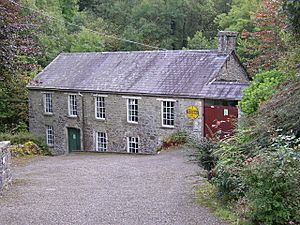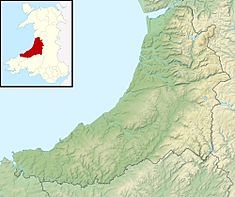Rock Mill Llandysul facts for kids
Rock Mill Llandysul, known as Welsh: Melin Wlân in Welsh, is a very special place. It's located in Capel Dewi, Llandysul, in Ceredigion, Wales. This mill is unique because it's the last woollen mill in all of Wales that still uses a powerful water wheel to run its machines! It's like stepping back in time to see how things were made long ago.
Where to Find Rock Mill
The mill sits in a narrow valley. This valley is carved by the Afon Clettwr river. This river is a smaller stream that flows into the bigger River Teifi. You can find the mill on a small road. It's about half a kilometer (0.3 miles) southeast of St David's church in Capel Dewi. Capel Dewi itself is about 4 kilometers (2.5 miles) east-north-east of Llandysul. Water reaches the big wheel through a short channel. This channel is called a leat, and it brings water from a small dam on the river.
A Look Back: History of the Mill
During a time called the Industrial Revolution, the Teifi Valley became very important. It was the heart of the Woollen industry in Wales. Thousands of people worked here. They were weavers, spinners, dyers, knitters, and tailors. The rivers and streams in the area powered many mills. Sheep from the nearby fields provided wool. This wool was then made into many different products.
Rock Mill was built in the 1890s. It was built by the great-grandfather of the person who owns it today. The mill building has two floors. It's made of strong stone. The floors are made of flat stones, and the ceilings are not very high. The same family has run this mill since it first opened. It has always been a place for spinning and weaving wool. Not much has changed there over the years. Today, Rock Mill is the only commercial woollen mill in Wales. It is still powered by water and is still making products.
Rock Mill Today
The mill still uses its original water wheel. This wheel is made of cast-iron. It was built by the "Bridgend" foundry in Cardigan. The wheel is huge! It's about 3.6 meters (12 feet) across and 2.1 meters (7 feet) wide. This giant wheel turns long rods called line shafting. These rods run through the mill. They directly power the machines that prepare the wool. These include the carding and spinning machines. The water wheel also powers a generator. This generator makes electricity for two looms.
You can visit Rock Mill! It's open to visitors from spring until autumn. There's also a shop where you can buy textiles. The mill is famous for making blankets. These blankets have traditional "tapestry" designs. This means they are double-woven, making them extra special. Other items made from the mill's yarn include throws, rugs, and shawls.
 | Delilah Pierce |
 | Gordon Parks |
 | Augusta Savage |
 | Charles Ethan Porter |



